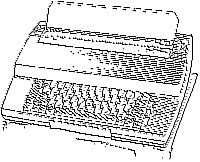| This session explores a striking but as yet little understood convergence in Romantic studies. The convergence, which bears upon the profession generally but is at present especially acute in the Romantics field, is between canon revision and the creation of online resources. | |
 |
Canon revision has recently come to a climax in the field with the closely spaced publication of
four major print anthologies dedicated to expanding the curriculum beyond the traditional six male Romantic poets (McGann, 1994; Wu, 1994; Perkins, 1995;
Mellor and Matlak
, 1996).[1] (See the related session at MLA '96 on Anthologizing Romanticism.) As attested by
the intense discussion of these anthologies on the
NASSR-L listserv of the North American Society for the Study of Romanticism in 1995
and again in 1996, such publications are being received as effectively rewriting the period at the infrastructural level of textbooks. Meanwhile, the critical
literature on the period has kept pace by increasingly focusing on women Romantic authors as well as on whole genres that had fallen by the wayside (e.g.,
drama). Even with the new anthologies, however, the constraints of the print medium continue to be a common source of complaint: either women and other
previously "minor" authors are represented by a slim selection of works or pages devoted to the "major" authors shrink drastically.
Simultaneously, the last two years have witnessed an explosion of interest in online (and especially World Wide Web) Romanticism. The Romantics field is currently advanced in this regard owing not just to many individual scholars but to the preparatory work of such centers of Romantics digital development as the U. Pennsylvania English Dept. and the U. Virginia Institute for Advanced Technology in the Humanities and Electronic Text Center.[2] It was the early and ongoing work of such sites (initially in Gopher and SGML formats) that primed the field to exploit the Web. Currently, major archival-scale projects either online or underway include The Romantic Chronology (UC Santa Barbara & Miami U., Ohio), The British Poetry Archive, 1780-1900 (UVA), The Blake Archive (hosted at UVA), the various course-related resources at U. Penn (with their substantial non-canonical Romantics holdings), the Romantic Circles project (various U. S. locations), The Bluestocking Archive (U. Mass.), the Women Romantic-Era Writers Page (U. Nottingham, UK), Romanticism On the Net (Oxford U.), and Romanticism: CD-ROM (U. Alberta). The number of such projects both large and small has now reached a critical mass able to sustain not just scholarly and pedagogical interest but critical/theoretical inquiry. Of special importance to this confluence of interests is the fact that many of the projects have advanced well beyond putting plain texts on line to experimenting with hypertext and multimedia in a medium-specific and -aware manner. For Romanticists, after all, Blake was the first McLuhan; the Songs of Innocence and of Experience--in their visual/verbal experimentation and implicit media critique--were the first Web page. |

